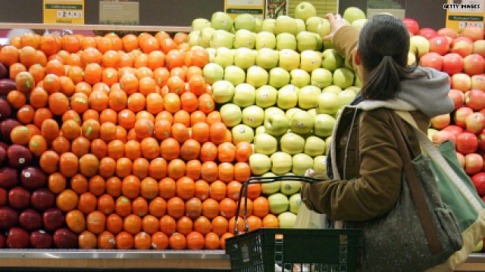Flashback:
– And Now: One Of The World’s Most Dangerous Chemicals As Pesticide In Strawberry Fields:
…
It’s called methyl iodide, and even some chemists won’t go near it. It’s such a powerful and reliable carcinogen that researchers use it to induce cancer in lab animals.
But go ahead, take a bite. California says it’s OK — and never mind the five Nobel-winning chemists and dozens of other experts who’ve written a letter begging the EPA to keep this poison out of strawberry fields, forever.
Who do you believe — a roomful of Nobel winners and their trusted colleagues, or a bunch of politically motivated bureaucrats?
This toxic monster has been linked to thyroid tumors, nerve damage, and brain and lung problems. It’s also been known to cause miscarriages in lab animals — when it’s not being used to give them cancer.
…
– 7 banned food chemicals still allowed in the U.S. (HLNtv, Oct 30, 2014):
- Also known as ‘7 Reasons to Either Buy Organic or Immediately Move to Europe’
- Other nations taking fewer food chances than America
- Whiskey sold in U.S. just recalled in European nations
Three European nations decided this week they would rather not continue to keep drinking an ingredient that’s also found in antifreeze. Seems reasonable enough.
Cinnamon-flavored Fireball whiskey, owned by a Louisiana-based company, was recalled from shelves in Sweden, Norway and Finland over concerns about the amount of Propylene glycol in it. Consumption of the sweetener/antifreeze component is more tightly regulated in Europe than the United States, so when a U.S. batch of the stuff hit Scandinavia, it had to go.
Both the Food & Drug Administration and Centers for Disease Control & Prevention say Propylene glycol is safe for food use in certain amounts, but Europe is a lot tougher on it.
In fact, America is pretty laid back on a lot of food ingredients that other nations around the world have already banned over concerns that they are carcinogens, can disrupt the nervous system or contribute to any number of dangerous health side effects.
Here are seven of those ingredients, which you’ll find listed on food labels throughout your friendly, local U.S. supermarket, but which are forbidden in many other countries.
1. Recombinant bovine growth hormone (rBGH) and somatotropin (rBST)
What is it? Growth hormones that increase a cow’s dairy production.
What it’s in: Milk and other dairy products.
Where it’s banned: The European Union, Australia, Canada and Japan.
More info: Click here.
2. Olestra (Olean)
What is it? A fat substitute.
What it’s in: Fat-free potato chips.
Where it’s banned: The UK and Canada.
More info: Click here.
3. Ractopamine
What is it? A growth booster for livestock.
What it’s in: Cattle, pigs, turkey.
Where it’s banned: Approximately 160 countries, including China, Russia and the European Union.
More info: Click here.
4. Diphenylamine (DPA)
What is it? A chemical used to preserve the skin coloring of apples.
What it’s in: Apples.
Where it’s banned: The European Union.
More info: Click here.
5. Azodicarbonamide (ADA)
What is it? An additive that accelerates flour bleaching and makes it rise faster.
What it’s in: Bread and almost 500 commercially available baked goods and snacks. Also, yoga mats.
Where it’s banned: Australia and Europe.
More info: Click here.
6. Brominated vegetable oil (BVO)
What is it? Additive that keeps flavor from separating in sports drinks and sodas.
What it’s in: Citrus-flavored sports drinks and sodas. Also, flame retardants. Coca-Cola and Pepsi stopped using it this year.
Where it’s banned: Europe and Japan.
More info: Click here.
7. Butylated Hydroxyanisole (BHA) and Butylated Hydroxytoluene (BHT)
What is it? Preservatives used to keep fats from turning rancid and maintain food color and odor.
What it’s in: Cereal, gum, butter, frozen meals, beer, potato chips.
Where it’s banned: Japan, England and several other European countries. California lists it as a possible carcinogen.
More info: Click here.
